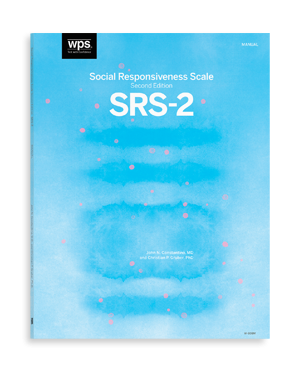Social Responsiveness Scale, Second Edition (SRS-2) identifies the presence and severity of social impairment within the autism spectrum and differentiates it from that which occurs in other disorders. 
Social Responsiveness Scale, Second Edition
SRS-2
Social Responsiveness Scale, Second Edition (SRS-2) identifies the presence and severity of social impairment within the autism spectrum and differentiates it from that which occurs in other disorders.‹ View all tests and materials
SRS-2 Adult S/W Kit W-610S
9780749167301
Qualification Level
B
Includes 25 Adult (Relative/Other Report) AutoScore Forms; 25 Adult (Self-Report) AutoScore Forms; Manual; Unlimited-Use Scoring Software. Requires PC with Windows 10, 8, 7, Vista or XP. CD-ROM drive and USB port required. Software kit for ages 19 years and up.
£569.10